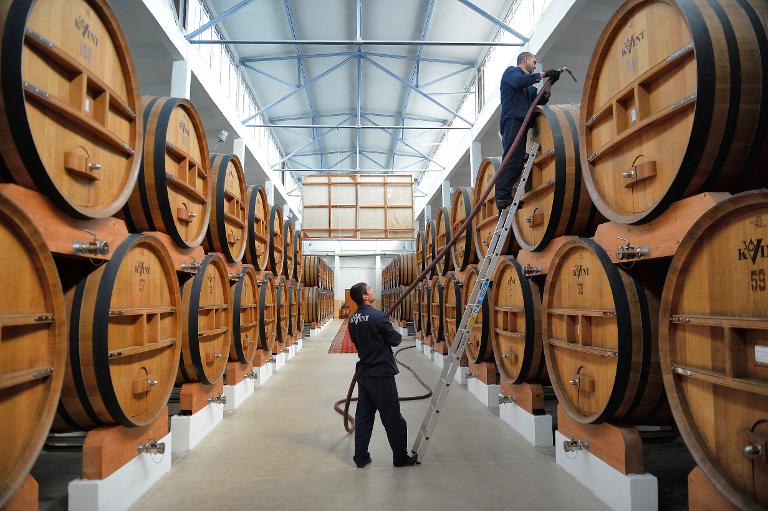
EU or Russia? An economic dilemma for Transdniestr
(MENAFN- AFP) Founded under the tsars, the Kvint brandy distillery has survived three wars and the upheavals of history from Communist rule to the collapse of the Soviet Union.
Today, the wine and spirit producer operates from Transdniestr, a breakaway region in Moldova whose economy faces a tough choice between Russia and the European Union.
The pro-Russian strip of land wedged between Ukraine and the Dniestr river proclaimed independence from Moldova in 1990.
Although it has not been recognised by any state, it has its own parliament, currency, and exists in a state of de-facto independence after a war that left 800 people dead.
"Kvint was founded in 1897 and of course it lived through all the ups and downs of history in this region", Anna Kozyrina, the distillery's PR-manager, told AFP in Tiraspol, the "capital" of Transdniestr.
The famous spirit produced by Kvint -- Russians, Ukrainians and Moldovans call it "cognac" -- has had its fair share of glory, making it to the Vatican and even into space, thanks to Russian cosmonauts.
But it was hit hard by Soviet leader Mikhail Gorbachev's anti-drinking campaign in 1986: vineyards were uprooted and for a year Kvint had to produce fruit juices instead of spirits.
Since then, Kvint has replanted more than 1,500 hectares of vineyards. It produces 20 million bottles a year and has revenues of $50 million.
Kvint's Divines -- the name given to the top-end brandies -- are exported to Italy and China, although Russia, Moldova and Ukraine remain the company's main markets.
But as tensions soar between Russia and the West over Ukraine, Kvint and the main players of the Transdniestr economy face two nagging challenges.
- Caught in the middle -
The first is a potential erosion of trade with Kiev.
"The crisis has not affected us so far, but if it continues, it will impact our exports", Kozyrina said.
But the main bone of contention lies with the association agreement Moldova is due to sign in June with the EU, a move the pro-Kremlin authorities in Tiraspol fiercely oppose.
"What is happening in Chisinau, these moves towards the European Union are counter-productive", the president of Transdniestr, Yevgeny Shevchuk, told AFP.
He wants the enclave to join the Kremlin-led Customs Union, a nascent alliance at the heart of Russian President Vladimir Putin's bid to extend Moscow's influence.
It was fierce divisions in Ukraine on whether to move closer to the EU or stay in Russia's orbit, that plunged the country into a deadly crisis.
"Of course, the authorities in Tiraspol have to show that the EU is not a necessary partner for the economy, rather Russia. However, trade statistics show the majority of exports go to Europe", a member of the EU Border Assistance Mission to Ukraine and Moldova (EUBAM) told AFP.
The EU absorbs up to three-quarters of the total volume of goods produced in the enclave, compared to between 15 to 20 percent exported to Russia, according to data sent to AFP by EUBAM.
Many European high-street brands have their clothes and shoes produced in Transdniestr due to the lower labour costs. The average salary is 200 euros a month.
Tirotex, the local textile giant, exports about 70 percent of its production, mainly to Europe.
"Transdniestr has a lot to gain from an association agreement with the EU", the head of the EU delegation in Moldova, Pirkka Tapiola told AFP.
Accusations that the deal -- which includes a free trade agreement -- would block access to markets in the East "are a myth", he said.
"The agreement is not limiting Moldova's sovereignty to sign trade agreements" with others, he added, an implicit reference to Russia.
- Risk of isolation -
But Russia's influence in Moldova and Transdniestr extends beyond being an important export market.
Both are heavily dependent on Russian gas. Tens of thousands of their residents also currently work in Russia.
With the rising tensions in Ukraine, the gap between the pro-European government in Chisinau and the pro-Russian separatists in Tiraspol has widened.
At the moment, firms in the Transdniestr strip are exempted from EU custom duties like any Moldovan company -- even if Tiraspol imposes duties on EU imports.
But if the new trade agreement comes into force, goods from Transdniestr could face heavier duties.
"The risk for Transdniestr -- if they refuse any kind of compromise with Moldova and the EU -- is isolation", a source close to the talks stressed.
But for ordinary citizens like Yelena Rotari, a vegetable seller at the Tiraspol market, there are fears of what it could mean for their livelihoods.
"We were told that with the EU we will not be able to sell our products directly anymore, we will have to sell them to supermarkets for a much lower price", she says.

Legal Disclaimer:
MENAFN provides the
information “as is” without warranty of any kind. We do not accept
any responsibility or liability for the accuracy, content, images,
videos, licenses, completeness, legality, or reliability of the information
contained in this article. If you have any complaints or copyright
issues related to this article, kindly contact the provider above.


















Comments
No comment